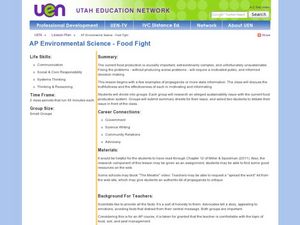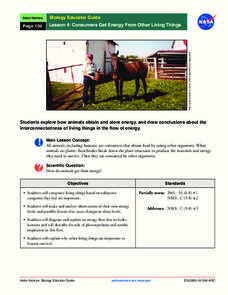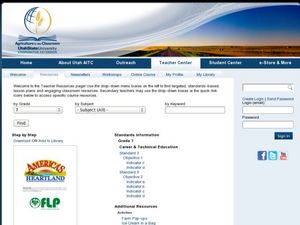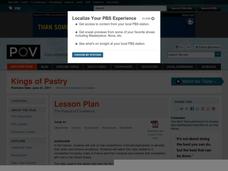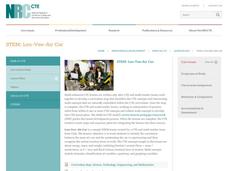Curated OER
AP Environmental Science-Food Fight
The content in this lesson is of a controversial nature. Please review to make sure it is suitable for your class. A video, The Meatrix is shown to the class, and then they discuss the emotionally-charged language that it uses. They are...
Curated OER
Kitchen Vocabulary Words
Working in groups of four, class members sort cards, labeled with kitchen equipment vocabulary words, into groups based on function, i.e., mixing tools, measurement tools, serving tools, baking pans, stove top pans, or preparation tools....
NOAA
An Ocean of Energy
Young biologists trace the path of the sun's energy through marine ecosystems in the second part of this four-lesson series. Building on prior knowledge about producers, consumers, and decomposers young scholars are introduced to the...
Baylor College
Plant Parts You Eat
Plants provide a variety of delicious foods essential for human survival. In the fourth lesson of this series on food science, young scientists investigate common fruits, vegetables, and grains in order to determine which plant part is...
Ventura County Air Pollution Control District
Effects of Global Warming
Your learners have probably heard of climate change, but do they really understand what it is? Study the history, details, and future implications of global warming and the greenhouse effect with a set of activities designed for an...
Purdue University
Eco-llapse
A balanced ecosystem doesn't mean balanced populations. Budding scientists complete a series of activities to learn about the relationship between producers and consumers in an ecosystem. They complete the wildlife conservation...
Baylor College
Food Webs
Explore various ecosystems from around the world as your class discovers the interdependence of all living things. Using the provided sets of ecosystem cards, young scientists work in small groups building food webs to demonstrate the...
NASA
Consumers Get Energy From Other Living Things
How do plants and animals get their food? Learn about where energy comes from, how animals store energy, and aerobic respiration, in a instructional activity that allows scholars to diagram energy flows.
Curated OER
High-Tech Food: Science in Your Shopping Cart
Kids are given a lot to think about, as they delve into the world of high-tech foods. They discuss GMOs, biotechnology, food enhancements and domestication. They view videos, engage in class discussions, complete worksheets, and learn...
Howard Hughes Medical Institute
The Making of the Fittest: Got Lactase? The Co-evolution of Genes and Culture
Got milk? Only two cultures have had it long enough to develop the tolerance of lactose as an adult. Learn how the responsible genes evolved along with the cultures that have been consuming milk. This rich film is supplied with a few...
Science Matters
Energy Flow
Budding scientists work collaboratively to reenact energy flow in a food chain. Scholars take on roles such as producer and consumer and perform tasks that symbolize energy flow in order to provide evidence of how much energy passes...
NOAA
Understanding Food Chains and Food Webs
Jump into an exploration of marine ecosystems with the first lesson in this four-part series. After first learning about crustaceans, mollusks, and other forms of sea life, young marine biologists view a PowerPoint presentation that...
Science Matters
Matter Cycles — Sum It Up
Scholars become part of the cycle of matter with a reader's theater that showcases producers, consumers, decomposers, and the sun. A diagram and discussion concludes the learning experience and enhances comprehension.
Carnegie Mellon University
Home Energy Audit
Youngsters make a mental assessment of electricity-consuming appliances in their homes and then evaluate them for the amount of energy consumed. They learn how to use power meters and measure the electrical consumption of several...
Safe Drinking Water Foundation
Water Bottles Everywhere
Young environmentalists examine how water bottle use is polluting the waters on our earth. In groups, your students study the handout on their assigned topic and present their findings to the rest of the class. Leading up to this lesson,...
Curated OER
America's Heartland: Step-By-Step Lesson Guide
An excellent resource gets kids looking at agricultural production to better understand the careers needed in distributing foods from the farm to the consumer. Book, poster, web, and video links are included for teacher use. There is...
Cornell University
Energy Changes in Chemical Reactions
The heat of solution measures how much thermal energy a dissolving substance consumes or gives off. The experiment demonstrates both endothermic and exothermic reactions. Scholars dissolve several substances, measure the temperature...
PBS
The Pursuit of Excellence
Who doesn’t love French pastries and the idea of hard work? Discover different philosophies on hard work, and the skills of French pastry chefs as the documentary concerning the “Best Craftsmen in France” or Meilleures Ouvriers de France...
National Park Service
Living & Non-Living Interactions
What better way to learn about ecosystems than by getting outside and observing them first hand? Accompanying a field trip to a local park or outdoor space, this series of collaborative activities engages children in learning about the...
EduGAINs
Go H2O! Investigating Residential Water Systems
Before your learners excuse themselves to get a drink at the water fountain, prompt them to think about where that water comes from. A middle school science instructional activity encourages groups to research their community's source of...
British Council
Plastic-Free Is Not Easy
Paper or plastic? Scholars discuss a worksheet containing grocery photos in which consumers were challenged to buy items without plastic wrapping or containers. Learners rank the food items by the need for packaging, such as a banana,...
King County
Reproductive System
It's every health and science teacher's favorite subject to cover: the reproductive system. This comprehensive lesson introduces adolescents to the reproductive anatomy of men and women with the help of a series of diagrams, discussions,...
National Research Center for Career and Technical Education
STEM: Lou-Vee Air Car
A comprehensive lesson plan on acceleration awaits your physicists and engineers! Two YouTube videos pique their interest, then sample F=ma problems are worked and graphed. The highlight of the lesson plan is the building of a Lou-Vee...
Desert Museum
Daisy Ecology
Here's a fine lesson that combines poetry with life sciences. Learners carefully listen to a poem that's all about a food chain. As the poem is read, learners name the producer, the herbivore, the carnivore, and the omnivore. Lots of...
Other popular searches
- Family and Consumer Sciences
- Family Consumer Science
- Consumer Science Foods
- Consumer Science Manners
- Health and Consumer Science
- Consumer Science Fibers
- Consumer Science Fibres
- Fm & Consumer Science
- Family & Consumer Sciences
- Consumer Science Fib Res
- Consumer Science Careers
- Food and Consumer Sciences


